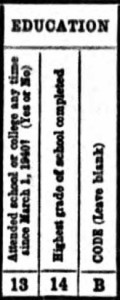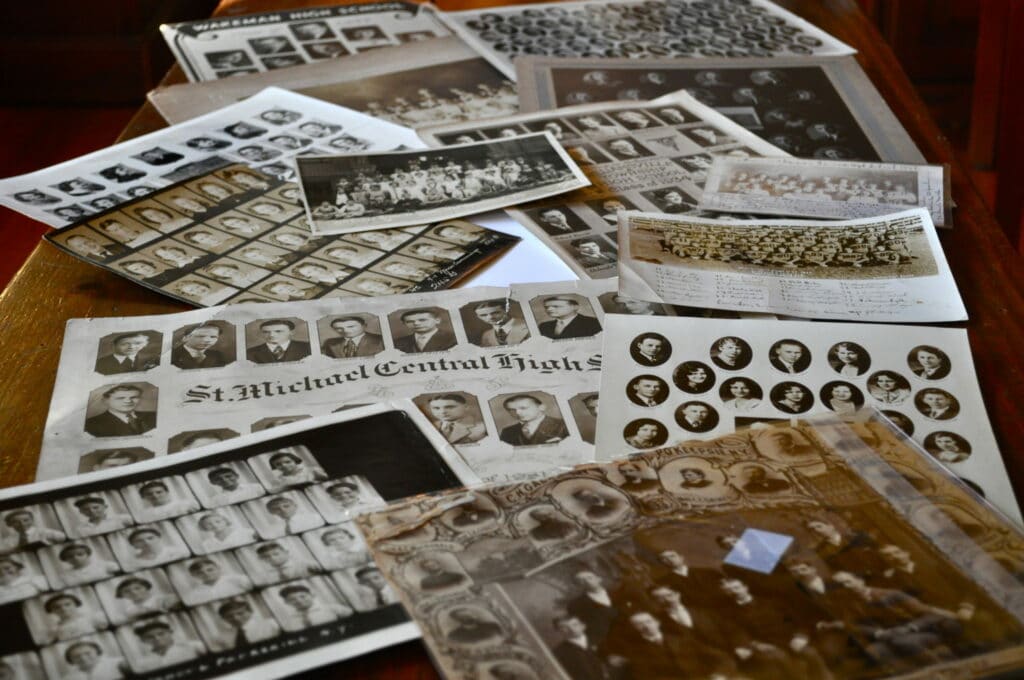Photo Caption: Jodi’s recent class photo purchases (stop her before she buys again!)
I have a problem. That’s the first step to recovery right? I am addicted to purchasing old class photos. To help myself I have given up eBay for Lent (I can hear the share price dropping as I type this.) This picture of my recent purchases should convince you of my sickness.
Admittedly I loved school as a child and hated missing even one day (that completely baffles my kids). My husband jokes that I collect degrees. After I got my second Masters degree, an MBA, I seriously considered going to law school. Luckily, my brother the lawyer talked me out of it.
So somehow, this all translates into a love of vintage photos of graduating classes, old school houses, and yearbooks. There’s something about a group of kids, brought together by one thing – location. As I research each member of a class I’m amazed at either how they managed to take such similar paths or diverge so completely.
While I struggle to really understand what it is that draws me to this subject; I think it has to do with an appreciation for something we shouldn’t take for granted: an education. Going to college, or even high school, was a luxury for many as few as 100 years ago. That’s what makes the fact that anyone tried so special. The current high school applications we stress over, “resumes” our 13 year olds are expected to have, would have been unfathomable to my great-grandparents. But education was important to them. My grandfather took his own and ours very seriously. He was hugely supportive both financially and emotionally through my brother’s and my high education endeavors.
“Education level” is now a must-have-stat for everyone in my tree. It’s such an important part of any individuals’ story. Anyone can be born or die, but getting an education takes extra, sometimes heroic, effort. The 1940 census is a great tool to start with. Column 13 and 14 ask specific education level questions (see below). In earlier censuses you will find questions about ability to read or write; that too is significant data as you consider who your ancestors were and how they lived. Here are just a few questions I’ve applied to my own research: Was my ancestor educated? How? By whom? For how long? At what cost? If you are interviewing relatives add these into the mix. Ask anything you can think of; just ask the question.



Thanks Peggy, That’s wonderful – what you’re teaching sounds exciting and necessary. Congrats!
Jodi
This is a wonderful post! As a matter of fact, I just completed a new presentation on using school records to research our ancestors. I gave it for the first time last Saturday at an all day conference, and they really seemed to like it! Some had never thought of using school records.
Great job!
Thanks so much Dr. Bill! Now, I’m happy just learning from my ancestors – gotta save the rest of my money to educate the next generation!
Jodi
Totally agree with you on education. Within my little family: wife, 3 daughters, 2 sons-in-law we have 4 PhDs, a few masters and bachelors, as well. And I thought seriously of the law degree, too… brother-in-law just appointed to Supreme Court of Alaska. We love to learn, and are life-long learners.
Also,
Welcome to the GeneaBloggers family. Hope you find the association fruitful; I sure do. I have found it most stimulating, especially some of the Daily Themes.
May you keep sharing your ancestor stories!
Dr. Bill 😉
http://drbilltellsancestorstories.blogspot.com/
Author of “13 Ways to Tell Your Ancestor Stories” and family saga novels:
“Back to the Homeplace” and “The Homeplace Revisited”
http://thehomeplaceseries.blogspot.com/
http://www.examiner.com/x-53135-Springfield-Genealogy-Examiner
http://www.examiner.com/x-58285-Ozarks-Cultural-Heritage-Examiner
http://www.examiner.com/heritage-tourism-in-springfield-mo/dr-bill-william-l-smith
http://www.squidoo.com/lensmasters/drbilltellsexcitingstories
The Heritage Tourist at In-Depth Genealogist: http://www.indepthgenealogist.com/
You’re right Elaine. Even today that can be a divider. And family “sociology” Sounds like a good term to me!
I’d not really thought about education as part of genealogy research before – intriguing thought. But of course it was one of the main dividers between family branches, too – those who ‘got on in the world’ and those who didn’t, often lost touch with one another – so it’s part of the sociology [?correct term?] of the wider family.